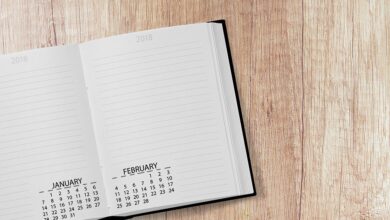
In today’s fast-paced world, time is of the essence. We’re all juggling multiple responsibilities, from work and family to personal goals and hobbies. It can be overwhelming to keep track of everything, leading to stress, overwhelm, and a feeling of constantly being behind schedule. But the good news is that managing your time effectively is entirely within your control. By using a calendar to plan and organise your days, you can reclaim control over your schedule and achieve more in less time.
The key to mastering your life is to manage your time effectively. Learning how to use a calendar for success is a critical skill that can help you maximise your productivity and achieve your goals. Whether you’re a busy professional, a student, or a stay-at-home parent, a well-organised calendar can help you stay on top of your commitments and make the most of your time.
Here are some tips for using a calendar to master your life and achieve success:
1. Set Clear Goals: Before you start planning your time, it’s essential to have clear goals in mind. What do you want to accomplish in the coming days, weeks, and months? By having a clear vision of your objectives, you can create a plan on your calendar that aligns with your ambitions.
2. Choose the Right Calendar: In today’s digital age, there are countless options for calendars, ranging from paper planners to smartphone apps and online tools. Choose a calendar that suits your preferences and lifestyle. Some people prefer the tactile feel of a physical planner, while others may prefer the convenience of a digital calendar that syncs across all their devices.
3. Schedule Your Priorities: Once you have your goals in mind and the right calendar at your disposal, it’s time to start scheduling your priorities. Make a list of your most important tasks and allocate specific time slots for each one. Be realistic in estimating how much time you’ll need for each task, and allow some flexibility for unexpected developments.
4. Be Strategic: When scheduling your tasks and appointments, be strategic about how you allocate your time. Consider your natural energy levels throughout the day and schedule your most demanding tasks during periods when you’re most alert and focused. Additionally, try to group similar tasks together to maximise efficiency. For example, if you have several meetings in a day, schedule them back-to-back rather than scattered throughout the day.
5. Leave Room for Flexibility: While it’s essential to have a structured plan, it’s also important to allow some flexibility in your schedule. Life is unpredictable, and unexpected events can arise. Leave some buffer time in your calendar to accommodate last-minute changes or emergencies.
6. Review and Adjust: Your calendar should be a dynamic tool that can be adapted as needed. Regularly review your schedule to ensure that you’re on track with your goals and make adjustments as necessary. If you find that a particular strategy isn’t working for you, don’t be afraid to tweak it until you find a system that suits your needs.
7. Avoid Overloading Yourself: It’s tempting to pack your calendar with as many tasks and commitments as possible, but overloading yourself can lead to burnout and decreased productivity. Be mindful of your limitations and resist the urge to overcommit yourself. It’s okay to say no to non-essential tasks and delegate when possible.
8. Utilise Reminders: One of the benefits of using a digital calendar is the ability to set reminders for upcoming tasks and appointments. Take advantage of this feature to keep yourself on track and ensure that nothing falls through the cracks. Whether it’s a notification on your phone or an email alert, reminders can help you stay organised and punctual.
9. Schedule Self-Care: In the midst of managing your time and productivity, it’s crucial to carve out time for self-care and relaxation. Schedule regular breaks, exercise sessions, and personal activities that bring you joy and rejuvenation. Taking care of your physical and mental well-being will enhance your overall productivity and satisfaction with life.
10. Track Your Progress: Finally, use your calendar as a tool for tracking your progress towards your goals. Note your achievements, milestones, and areas for improvement. By keeping a record of your progress, you can stay motivated and see tangible evidence of your success.
In conclusion, managing your time effectively is an essential skill for achieving success and mastering your life. By using a calendar to plan and organise your days, you can make the most of your time and achieve your goals. With clear goals, strategic scheduling, flexibility, and self-care, you can maximise your productivity and lead a more fulfilling life. Start using a calendar today to take control of your time and pave the way for a successful future.





